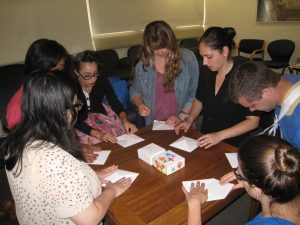Calswec Stipend Program
CalSWEC (Title IV-E) Program. The spirit of this stipend program is to support the education of students who are interested in a social work career in. CalSWEC Stipend Projects; CalSWEC Stipend Projects. Pathway Program. You may also visit the CalSWEC site.
. CalSWEC is a partnership between the schools of social work, public human service agencies and other related professional organizations to facilitate the integration of education and practice and assure that effective, culturally competent service is delivered to the people of California. Funded through Title IV-E monies, CalSWEC provides financial support to MSW students in exchange for a commitment to work in a public child welfare agency, within the State of California, for a minimum of one year for every year of support received. Two Year Stipend Program: The CalSWEC IV-E stipend program provides for two years of support, at $18,500 per year, for students enrolled in the Children, Youth, Women and Families (CYWF) concentration. Three Year Stipend Program: Students eligible to apply for the part-time CalSWEC reimbursement program must be employees of a County Child Welfare Service, County Departments of Social Services, or the California Department of Social Services. All part-time applicants must provide a letter of support from their agency administrator/director. Students participating in the program sign a contract to render one year of continuous and satisfactory full-time employment in their home public child welfare agency for each year of IV-E education support.
Once contracted, the student receives full tuition and fees, costs for required books (up to $500 per semester), and a travel allowance. For information about the Cal State LA CalSWEC Program contact at 323-343-5705. Also, please visit the main website based at the University of California, Berkeley. For both CalSWEC and IUC, you must be able to pass a criminal background check.
If you are unable to successfully complete any of the program requirements, you must repay the stipend. Admissions: To be considered for a stipend, student must:. Be in the Children, Youth, Women, and Families (CYWF) concentration. Complete the “Application for Public Child Welfare Stipend Program” included in the acceptance packet and return it with a Letter of Intent to the MSW Admissions Office.

Be in the Children, Youth, Women, and Families (CYWF) concentration.
CalSWEC Mental Health Stipend Program California Social Work Education Center - Mental Health Initiative Stipend Program (aka CalSWEC-Mental Health) is a collaborative effort between the Department of Mental Health and the Schools and Departments of Social Work to move toward a state-of-the-art, culturally competent system that promotes recovery/wellness for children, adults, and seniors with severe mental illness and serious emotional disorders. Funded through the California Department of Mental Health with Mental Health Services Act funds, CalSWEC II provides financial support to MSW students who are interested in pursuing a social work career in the public mental health field and are willing to make a commitment to work full-time in a California county out patient mental health agency or a county-contracted agency after they have received their MSW degrees. Stipends Contingent upon annual renewal of funding, the program provides a training stipend of $18,500 per year for full-time students who will be completing their second year of field placement.
Federal Stipend Programs
CalSWEC Mental Health Stipend Program Project Co-Coordinators for CSULB are:. Nancy Meyer-Adams, Ph.D. Rebecca Sander, Ph.D.
Steve Wilson, Ph.D., L.C.S.W. Responsibilities of CalSWEC Mental Health Stipend Recipients: Students who are accepted into this stipend program will sign a written agreement (a legal contract) which outlines their responsibilities and commitment to the CalSWEC Mental Health. These agreements are for the students’ tenure while in the graduate MSW program and for a period of five years following their graduation. The student recipient of the CalSWEC Stipend will agree to the following:.
Stipend Program Office Of Child Care

Child Development Stipend Program
To complete and graduate from the MSW program at CSULB within the required timelines established for each program model. To take all of the required classes, including mental health field internship placements, the approved mental health elective, and participation in two mandatory skill-building seminars on issues related to mental health, recovery model, and/or research in that regard. To have their Thesis/Project have a focus on a mental health topic in your specific concentration (either OAF or CYF). To continue to perform satisfactorily in the MSW program and remain in good academic standing (graduate GPA of 3.0 or better), including performance in field placement. To receive a security clearance/Live Scan to work in county mental health service. To inform the CalSWEC Mental Health Project Coordinators of any changes which will interrupt studies and/or delay expected graduation.
To continually uphold the NASW Code of Ethics. CalSWEC Mental Health Main Contact for CSULB Students Nancy Meyer-Adams, Ph.D CalSWEC Mental Health Stipend Program Project Co-Coordinator 562-985-5655 Understanding Mental Health Recovery Special Disclosure Notice for All Applicants and Recipients of CSULB Social Work Stipend Programs: Financial Aid Disclosure Policy for BASW and MSW Students Receiving Stipends, Awards or Scholarships The School of Social Work will forward information about all students receiving stipends, awards and scholarships to the University’s Financial Aid Office. The information provided by the Department will include the student’s name, student ID number, source of funds, amount of funds and the semester/time frame of the financial award. Please be aware that this may change all funding students receive, if any, from the Financial Aid Office. Students applying for a stipend, award or scholarship are encouraged to contact the Financial Aid Office directly to discuss their overall financial aid package.